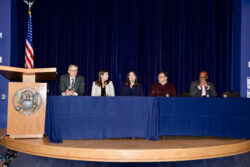ONLINE ONLY—In an online chat with nationwide university publications on Thursday, Facebook.com’s CEO Mark Zuckerberg and co-founder Chris Hughes defended the News Feed and Mini-Feed features originally launched on Sept. 5, despite well-publicized criticism from users. (treehouselodge.com)
The News Feed gives users an update on their friends’ latest “stories”– activities such as wall posts, profile changes and new friends added. The Mini-Feed is an exclusive version of the News Feed, listing an individual’s latest stories, and is located on each user’s profile.
Hughes wrote that they got much more feedback in response to the latest innovations than following previous makeovers. But, he wrote, “the vast majority of our users aren’t telling us they want them [the new features] gone.”
“People told us they wanted more control over them, so that’s what we looked to give them,” he added.
Laura Shoemaker (COL ‘07), who surfs Facebook daily, hated the new tools at first, but was satisfied after Zuckerberg posted a letter on the site’s homepage saying that users can tame the feeds with privacy controls.
“I just upped all my privacy controls. Nothing I do goes on the News Feed,” Shoemaker said.
Facebook’s bosses acknowledged that they should have offered more privacy controls over the feeds from the start. They wrote that they are still working on enhancing the user control over the features but want more feedback on how to do so.
Throughout the hour-long chat, Zuckerberg and Hughes continuously argued that the latest additions are consistent with the overall purpose of Facebook: to help people better understand what’s going on around them.
“The feed products make sense as the next evolution of Facebook,” Zuckerberg wrote. “People generally use Facebook to get a sense of what’s going on with the people around them and understand their world a little better.”
The new tools make what was already available – a search of every single friend’s profile daily – much easier.
“In the past week, we’ve received a lot of feedback from people that they learned things about their friends that they would have otherwise missed,” Zuckerberg wrote.
As a result of the new tools, Zuckerberg wrote that “we have seen a significant jump in people using the site, looking at information, and even posting new information to the site.”
Facebook is the seventh-most trafficked site on the Internet. Questions about the business side of Facebook, such as its advertising strategy, surfaced during the session but Zuckerberg and Hughes seemed reluctant to address them head-on, emphasizing that they are not interested in making money from the site. The team denied that the introduction of feeds, which has increased traffic, was motivated by ad revenue.
Zuckerberg would not disclose the number of new accounts created daily.
The duo also chatted about the expansion of Facebook to regional networks. Hughes wrote that users want their friends who are not affiliated with a college, high school or business to join the site.
Students are still buzzing about the feeds. Binky Rynne (COL ‘07) worries about people seeing photos of her captioned by others – photos that she did not post herself. Lizzie Jordan (COL ‘07) is more concerned about the dirty things she writes on other peoples’ walls.
“I can’t talk as much trash as I’d like,” she said.




